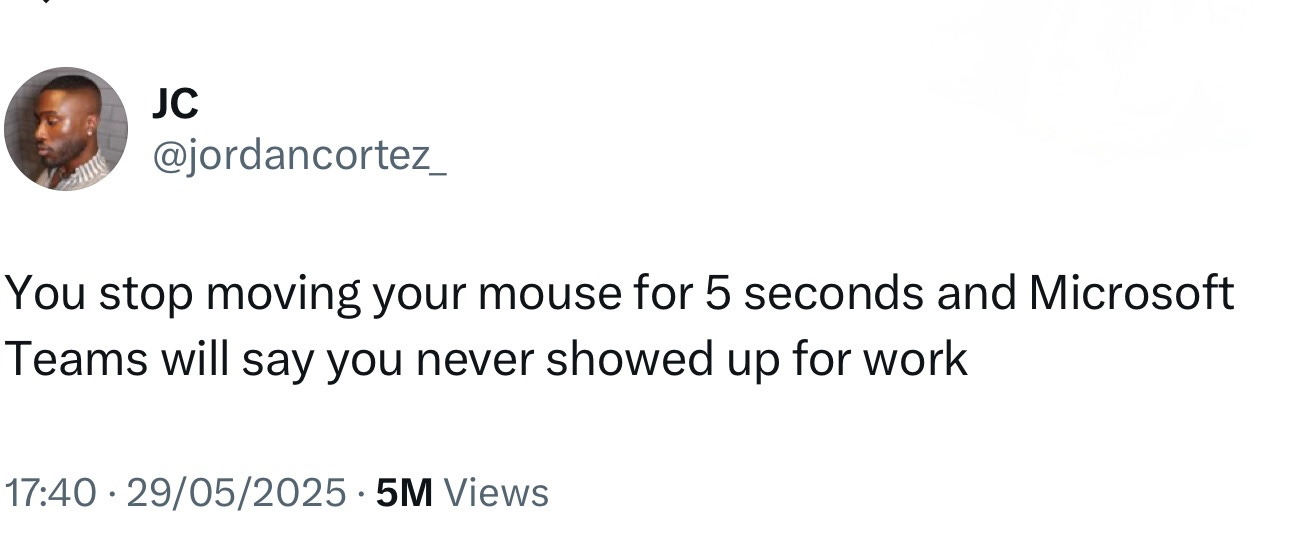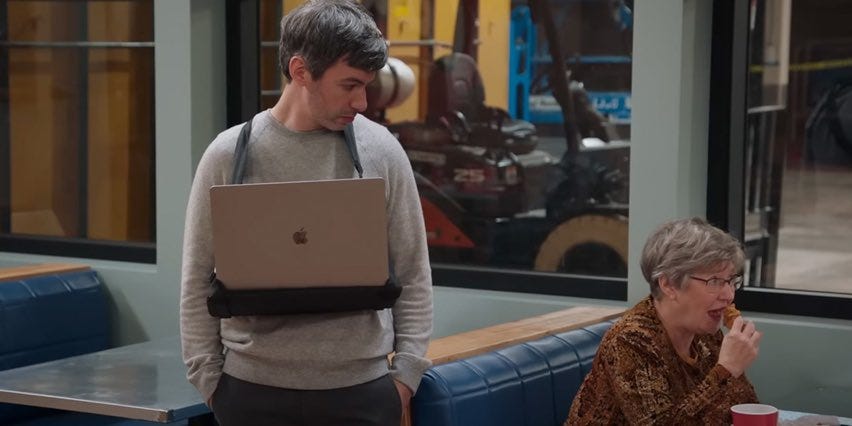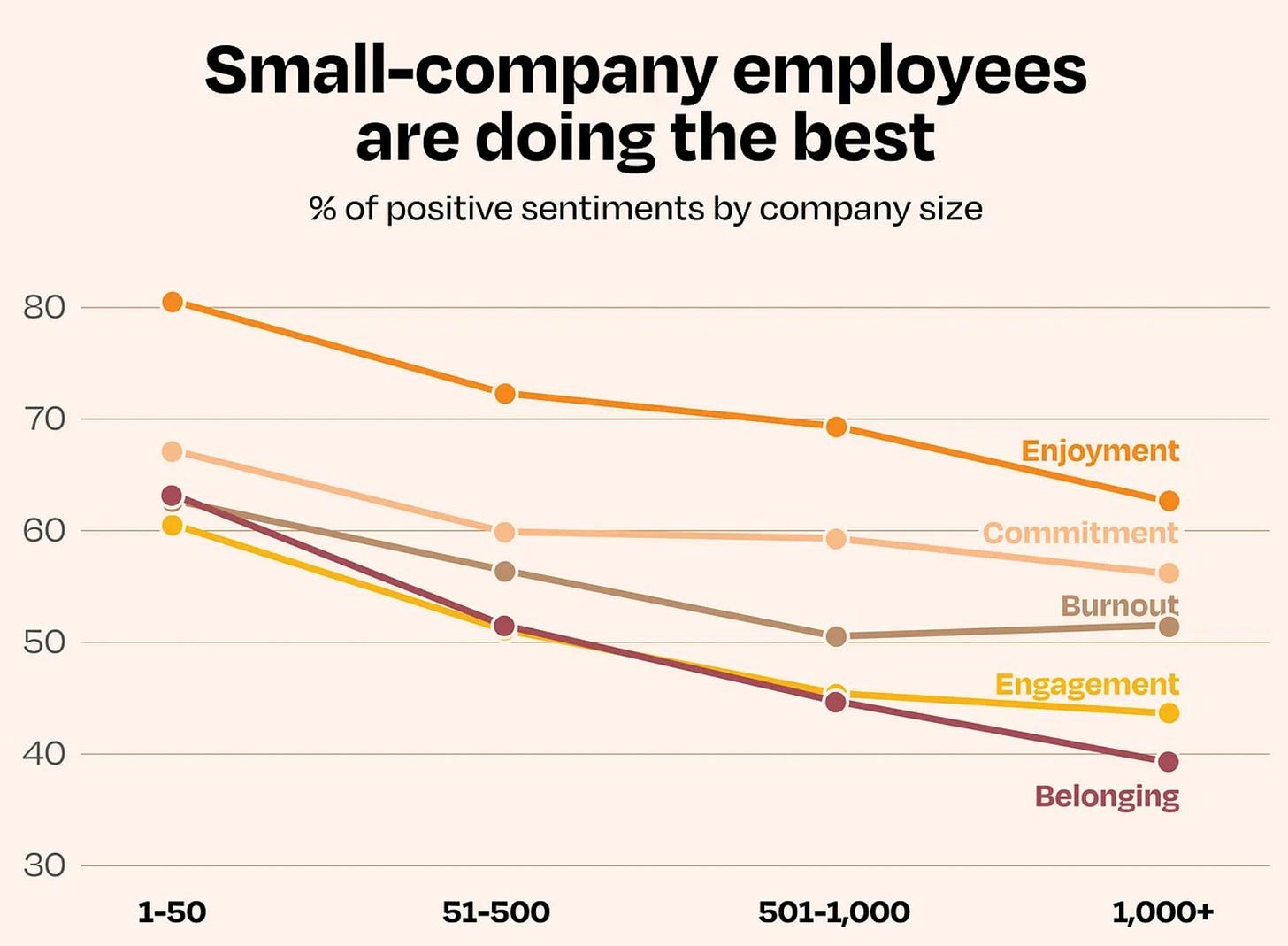'We realised our business model is now obsolete'
ALSO: The Rehearsal teaches us something important about work
I’m not going back to last week’s dark place. Down the page there’s lots to smile at, so if you’re done with AI chat scroll on.
But for everyone else let me at least address the comments to what I wrote last week. TL;DR last newsletter I talked about the challenges we’re facing with AI, saying that the more gloomy we get about our collective plight, the more motivated we might be to future-proof ourselves. Some people disagreed.
The post was an invocation to all of us to upskill ourselves, to take some personal responsibility even if our companies are sleepwalking. With blinkers on.
I’m not going to relitigate what I said but what I am going to reflect on some of the comments. A number of people threw their hands up and protested that computers could never replace human empathy.
It’s a lovely idea, charming even. But sadly in the real world evidence points to the opposite. When 550 people were surveyed to ask their experience of AI therapists, they found the robots to be more compassionate and more responsive.
In the survey the AI therapists were preferred to humans, I guess because we’re judging AI not versus the very best idealised version of us, but against real flesh and blood humans. When you last went to the doctors was your experience one of being spotlighted in the glow of their attention or being hurried out of the door in your allotted 7 minutes? It turns out that AI is better at appearing sympathetic, patient and less judgmental than stressed, busy humans.
On the other hand there were some outstanding insights in the comments, marketer Tricia Fox commented that her organisation ‘recently took part in a government pilot project of company wide training in AI systems related to our profession’. After hours of training and after analysing over 150 of their work flows Tricia concluded that the experience was ‘fascinating, transformational and horrifying’.
‘One thing was clear to me, our business model (of charging for skills and time) will be rendered obsolete by these technologies’. Another thing became clear from the pilot was speed: 'these technologies make time consuming activities much quicker, and therefore planning schedules have to change’. Tricia concludes that the most important thing for organisations is that they need to commit to understanding the new technology and training employees on them. Immediately.
I got the sense that a lot of commenters haven’t used the leading edge tools. One person observed that they’d heard an AI (it was Google’s Notebook LM) being weird on the Adam Buxton show. As your attorney I would strongly discourage you from making careers decisions based on a comedy podcast.
Someone else commented that LLMs are just ‘next word prediction engines’ a comment that illustrates the danger of a little knowledge. While it is foundationally true to say that LLMs were based on word prediction tools they now exhibit reasoning and sophisticated abilities to synthesise arguments. That talking point is a little bit embarrassing in truth. Honestly.
If you doubt what the tools are capable of here’s more to fuel your insight, in the form of Perplexity acting as a financial analyst or as a hedge fund analyst.
Other people dropped counter arguments or shared opposing views. For example, The Economist set out to disabuse the notion that there’s been a slump in the graduate hiring market, citing job market data from 2024. That one just doesn’t pass the sniff test of anyone who is close to that market in 2025. Certainly a much more rigorous investigation by Kevin Roose at the New York Times felt that there was reason to be concerned about grad jobs.
The Guardian highlighted real-life people losing their real life jobs to AI in 2025: journalists, illustrators, copywriters, graphic designers. Sam Altman reckons he’s got 95% of the advertising business in his sights. The CEO of Anthropic says half of white collar jobs will go and we should stop avoiding discussing it.
Hope doesn’t always get us what we want, a hard lesson I’ve learned from following mediocre sports teams and a lifetime of staying up late for heartbreaking election defeats. I’m not going back to last week’s dark place. But let’s be honest, optimism alone might not get us through this one. Not this time.
The Rehearsal (season 2) might be the most unlikely lesson about workplace culture that you consume all year. Nathan Fielder, a master of finding a laugh in uncomfortable moments, has returned with a second series of the show that coaches people through real world awkward scenarios by creating elaborately accurate rehearsals of them. His second series is a magnificent step-up from the first and plays like if Chris Morris leaned into cringe comedy.
The slightly unhinged 6 part season is an obsessive investigation of why airline crashes happen, and an exploration of how having better connections with your coworkers is an important part of doing our jobs.
John Goglia, a former board member of the National Transport Association told CNN:
‘In aviation, we've long known that communications has been an issue. And we've we have dealt with it, effectively through Crew Resource Management [an approach that systematises psychologically safe communication]. But what Nathan has uncovered was a little sliver that has fallen through the cracks, [a] communications disconnect between pilots. When he first came to me and mentioned that to me, it immediately caught fire with me because I've seen it. I've flown in many, many, many cockpits… I plan on taking that show to my students to show them’.
Fielder shows footage of pilots standing in silence as they wait to board a flight together, and draws on evidence to demonstrate that the lack of social connection is the leading cause of aviation accidents. It’s weird, funny and speaks truth about what is wrong with work.
Fielder's laptop harness is sure to become the geek chic item of the summer. (I found it here but didn’t take the plunge).
‘Laid off’ caps: top recession-coded merch of the summer just dropped
‘Shall we grab drinks after?’ has disappeared and it’s ruined work friendships
There’s definitely something fascinating in this research about company size and job satisfaction. We all want to feel that our work is consequential - that it matters. Workers in small companies are more optimistic about their career, more satisfied in their role and enjoy their jobs more. They’re also less burned out:
Essential reading: young, and black employees are disproportionately likely to be targeted by workplace surveillance systems. (In fact ‘research shows that black pre-schoolers, particularly boys, are monitored more closely than their peers. This surveillance, she explained, doesn’t disappear with age; it simply shifts into the workplace’). Beyond that shop-floor employees are more likely to be singled out for observation that office workers. Two-tier management in action
The sense of frontline workers feeling forgotten is backed up by a piece of global research published by Workvivo (owned by Zoom). They say that 87% of frontline workers don’t know if their company culture applies to them, almost half say they don’t know who their CEO is. 1 in 5 have never been recognised for what they have contributed. Half believe that office based colleagues are treated better. Personally I think every team feels a touch more loyalty to their friends than the company but it shows that we need to make sure that frontline workers don't feel undervalued
Your Whatsapps could get you fired: more than 2000 employment tribunals have used Whatsapp messages in the last 5 years. Hard one this because nothing says Wrong ‘un more than having disappearing messages turned on
Meditations for the Anxious ventured into the world of work by talking about ‘Corporate Girlies’ (don’t worry he took on ‘Tech Bros’ previously but the Girlies one is better)
The second of two episodes going deep on how AI is going to impact work - and workplace culture.
This week’s discussion was a live podcast recording at Workday’s Elevate London. As I was a paid contributor today it counts as a promoted episode but certainly stands as an important discussion. As I left the stage after the event I was approached by several attendees, all of whom told me that their organisations were doing nothing in the field of AI right now. It presented a vivid contrast of how this innovation is developing in twin tracks.
I’m joined by Jerry Ting, the founder of AI business Evisort which was acquired by Workday and Angelique de Vries Schipperijn, Workday’s EMEA President.
Listen: website (with transcript) / Spotify / Apple








The pilot episode of Nathan Fielder's show is fantastic! I've not been able to stop thinking about it because it's so honest and raw. Like, really, what if we actually created spaces for folks to be able to speak up at work? How transformative could things really be?!
"Someone else commented that LLMs are just ‘next word prediction engines’ a comment that illustrates the danger of a little knowledge"
I've seen this argument a few times and it really misses the point. The Wright brothers' plane and a 787 operate on the same basic principle, but the impact is very different!